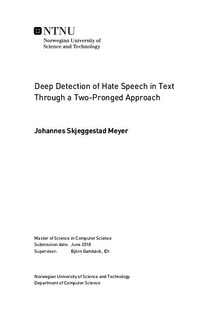Deep Detection of Hate Speech in Text Through a Two-Pronged Approach
Master thesis
Permanent lenke
http://hdl.handle.net/11250/2568080Utgivelsesdato
2018Metadata
Vis full innførselSamlinger
Sammendrag
With the widespread use of online services like Facebook and Twitter, disseminatinghateful messages has become a simple matter. These messages not onlyspoil the experience for other users of a service. There is also an increasing legalpressure for the services to prevent and remove such hate-spreading content. Forthis to be practically feasible, there is a need for systems that can automaticallydetect hate speech in text.
Research on automatic detection of hateful and abusive language has been anongoing project over the last 20 years. However, the state-of-the-art is still notgood enough to be practically usable for identifying hate speech in a fully automaticmanner. Thus, this thesis continues the efforts to reach that goal.
With the increasing legal pressure to remove hate speech, and the multitude ofservices and platforms this pressure applies to, detection approaches are neededthat do not depend on any information specific to a given platform. This is sothat the approach can be used across several different platforms without beingchanged. For instance, the information stored about the text s author may differbetween services, and so using such data would reduce the general applicabilityof the system. Therefore, the research in this thesis aims at avoiding any suchinformation, using exclusively text-based input in the detection.
This thesis proposes a novel, Deep Learning-based approach to hate speech detection,using a two-pronged architecture that combines both Convolutional NeuralNetworks and Long Short-Term Memory-networks. The proposed architecture usesCharacter N-grams and Word Embeddings as inputs to its two prongs, which thenmerge and produce a final classification. The experiments show that this architecture,using its optimal configurations, performs better than most state-of-the-artsystems.
